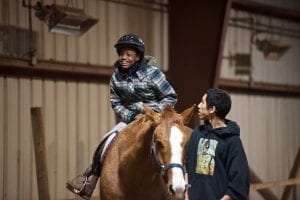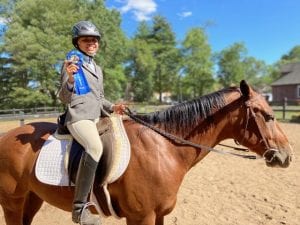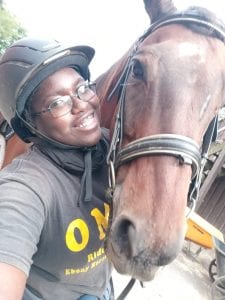A group of young Black men confidently guide their horses through the streets of Hartford’s North End. They smile and wave to friends and residents as they ride through the neighborhood. But this isn’t a chance encounter. They are members of the Junior Mounted Patrol Unit at Ebony Horsewomen, Incorporated, a non-profit equestrian and therapeutic organization located within Keney Park. These young men are a familiar site on the trails that wind through the 693-acre park. They report trail hazards to the Keney Park Sustainability committee, help with trail maintenance, and permanently mark trails and provide hospitality for visitors to the park on their weekly Sunday patrols.
Ebony Horsewomen and the myriad of programs they offer is a unifying figure in the North End and has been for over 36-years. Ebony Horsewomen is well-known for their youth programs, but the services they provide extend to a wider population and address mental health issues across all ages through their certified Equine Assisted Psychotherapy services.
Hartford’s North End is known as one of the toughest neighborhoods in a city that is constantly ranked as one of the most dangerous cities in Connecticut (WTNH, 2020). Growing up as a Black youth in Hartford can be stressful, challenging, and dangerous, says Patricia “Pat” Kelly, the founder and CEO of Ebony Horsewomen. The number of homicides in Hartford per year is above average and Black men are a disproportionate number of the victims (Perloe, 2020). Black girls and women face their own challenges. Ebony Horsewomen provides a place of connection, a safe place to learn, a home, a family, and guidance during the critical early years for youth.
The Ebony Horsewomen programs become a catalyst for participants and help them find their voice, their path, and reach their full potential. The impact of Ebony Horsewomen’s programs is larger than the number of youths served, or hours of programming provided. It’s about the individual lives that have transcended the circumstances that they were born into to achieve success.
“There are so many intricacies to what we do,” Pat says. “We are a herd here. When we all come together people understand there is a level of responsibility. It’s about training our participants to handle the situations they’re going to encounter in the rest of their lives.”
The Healing Power of Horses

Equine therapy is a widely accepted form of therapy. Youth and adults can work through their trauma in a safe place during equine therapy. The format allows the individual to open up on their own terms. A licensed clinical therapist works with participants, and sessions are covered by health insurance providers.
“Most of the clients at Ebony Horsewomen are people of color,” Pat says. “To better connect with the audiences that we serve, all of the therapists at Ebony Horsewomen are Black and Brown. It’s easier for a Black or Brown therapist to provide therapy to a white client than the reverse.”
There is a lot of growth and healing for participants through the equine therapy practice. During a session they may go for a walk in the park or brush a horse. The session is based on whatever works for the participant. It helps them open up to the therapist and talk through the issues they’re having. Equine therapy is a healing process so the participant can meet the challenges of the society that they live in.
“The horse becomes the instructor and our staff serve as guides. The horse is the master teacher,” Pat says. “Some of these are young men that could be dead, but the horses have provided them a path and made an impact. Equine therapy changes how the participant manages and approaches society. It is the horse that offers that healing. When they walk out of here, they still have to worry about being targeted but their mindset isn’t reactionary. They have learned to manage an 1,100-pound horse that’s misbehaving. Later, if they’re stopped by a police officer, they know how to handle the situation from a calm mindset.”
There are a lot of new families and individuals participating in the equine therapy sessions now, especially during COVID. The sessions at Ebony Horsewomen all adhere to social distancing guidelines. A recent study from the National 4-H Council found that 81% of teens cite mental health as a significant issue, and COVID is intensifying the issue (Harris Insights & Analytics, 2020). Youth often struggle in talk-therapy. Equine therapy works for them. Some participants can attend therapy as much as two or three times per week. Veterans and first responders also participate in the equine therapy programs at Ebony Horsewomen. Another course was offered to the Hartford Police.
“Mental health is the bottom line of what we do – it’s one of the greater challenges these kids have living in America as a Black person,” Pat says. “We have three boys that are old enough to get their drivers’ licenses now. It’s a rite of passage for young people but it scares me to death. Now, I’m not just worrying about them getting home safe, but about them driving while Black. That daily stress is layer after layer after layer.”
Positive Youth Development

Addressing those daily stress levels is one of the focus points of the youth-oriented programs that Ebony Horsewomen offers. Some youth in their programs would never be in trouble but they want to experience equestrianism. Ebony Horsewomen offers something for everyone, and all participants and horses are treated as individuals.
Positive youth development is a cornerstone of all programming. They offer mentoring, financial, and life skills. Youth opportunities include the Junior Mounted Patrol Unit, the Young Ladies Dressage Team, the Saturday Saddle and 4-H Club, the Extended Day Program, and the Summer Day Camp. Most youth participants are from Hartford, although some are from Bloomfield and Windsor. There are 15 to 20 youth participating in each program. The numbers are being kept lower during COVID but will increase again when its safe. Summer Day Camp serves between 80 and 100 youth each year.
“4-H Positive Youth Development is built upon the essential elements of belonging, independence, mastery and generosity. Ebony Horsewomen programs provides youth the opportunity to be a part of a community, demonstrate decision making through independent thinking, master experiential hands-on tasks and to demonstrate generosity in caring for animals as well as their peers,” says Jen Cushman, Hartford County 4-H Extension Educator.
Ebony Horsewomen has programs and partnerships with other members of the community as well. The Milner Elementary School had an afterschool program three days per week before the pandemic. Students learned safety and life skills and worked with the horses. This program transitioned to a virtual environment when COVID started with a Friday riding club that follows social distancing guidelines. A kindergartener class comes every Tuesday for small animal and agriculture activities. Partnerships exist with other agencies and organizations throughout the greater Hartford area.
“Many youths that participate have been through traumatic experiences and being at Ebony Horsewomen gives them a sense of hope and belonging,” Chaz Carroll says. He is the mentor for the Junior Mounted Patrol and the facilities manager. “They are a part of something that is empowering.”
Youth are also forming bonds with the staff and their fellow participants. “It’s amazing to see the connection kids can make with each other when they’re given a chance,” Pat says. “They’re learning about life and the differences of people regardless of their color or what the media says they are. It’s more than just life skills.”
Ebony Horsewomen participants have longevity with the program. For example, two recent high school graduates have been participating in programs since they were six years old. Chaz is an alumnus of the program. Dominique Bourgeois started as a program participant and is the director of programs now; she’s been working for Ebony Horsewomen for 18 years.
A Catalyst for Change
Program participants are a testament to the impact of the Ebony Horsewomen programs. Having a place to belong and a community that becomes a family is the catalyst for change for the youth and adults that participate in programs.
One student started with Ebony Horsewomen by stopping to visit daily. He hadn’t visited in a while when Pat received a phone call from the local psychiatric hospital that one of her students was requesting to see her. She didn’t have any missing students but went to the hospital. The young boy that had been stopping to visit the horses had attempted suicide and was there. Pat continued visiting him. He was in the hospital for a long time. They broke both of his hips trying to restrain him during an episode. When he finally got out of the hospital, he came to the barn every day.
“Chance, one of our horses, saved that boy’s life,” Pat says. “He received a full scholarship including housing, to the Cornell University Farrier Program. He was scared to go, but we pushed him. He didn’t think he was smart enough. He excelled there. Now he shoes horses up and down the East Coast. It’s about more than a youth program – there are so many layers to what we do here.”
Many of the youth refer to Pat as Mom, and her husband as Dad or Pop. Some youth are looking for a connection. Some have deteriorating thoughts about themselves and the horses tell those youth that, no, they are pretty smart. Some kids find their voice at Ebony Horsewomen. Others learn to better control their mouth. Each youth is treated as an individual and receives the support they need to reach their full potential.
Jen Cushman, Hartford County 4-H Extension Educator notes that the 4-H Study of Positive Youth Development (2013) concludes that “Effective youth development programs . . . are . . . focusing on three important areas: positive and sustained relationships between youth and adults; activities that build important life skills; opportunities for youth to use these skills as participants and leaders in valued community activities” (Lerner, Lerner, & Colleagues, 2013, p.3). Ebony Horsewomen’s programs accomplish all three of these goals.
“The education system is an atmosphere of testing and evaluation, it’s not about critical thinking, it’s about data collection,” Pat says. “Kids come out not developing their minds and we’re changing that here. We have kids that have graduated from Harvard University, attending on full scholarship, Howard University, Boston University, to mention a few, and many Black historical colleges, finding their voice and pushing through to their dream to their involvement with the horses.”
LaShawnda Phillips

One example of how the program helps youth achieve their dreams is LaShawnda Phillips. She started as a youth program participant with Ebony Horsewomen. “I took a stroll one day and found this place,” she says. “I never imagined that I would be learning about horses. I didn’t know I would have a connection with a horse. This place means the world to me.”
She has grown from a program participant to an associate riding instructor for the Saturday Saddle Club, the Ladies Dressage Team, and an equine and camp specialist. LaShawnda is currently a senior at UConn, and using the remote learning option during the pandemic. She’s an Animal Science major, and had opportunities to work with Dr. Jenifer Nadeau, the UConn Equine Extension Specialist. LaShawnda plans to continue teaching horsemanship and serving as a riding instructor after graduation. She’s also working on her equine psychotherapy certification as a Horse Specialist.
“LaShawnda has really grown in her time at UConn and has learned how to overcome any difficulties,” Jenifer says. “She is a wonderful person with a bright future ahead of her and has good horse sense and people sense.” LaShawnda and others from Ebony Horsewomen participate in the UConn Riding Camp Instructor Horsemanship Safety Camp and the annual Connecticut Horse Symposium hosted by the UConn Equine Extension program.
At UConn, LaShawnda is a member of the Western Team, an extra-curricular activity offered by the Department of Animal Science. “It’s my favorite part about school. I was the shy one, but Ebony Horsewomen and the UConn Western Team pushed me out of my comfort zone. I also love my teachers; they’ve all helped me a lot.”
“LaShawnda is one of the best examples of how a horse can heal, and she’s also a testament to Domonique and her work with the program and youth,” Pat says. “Dominique guided LaShawnda through high school and towards UConn, and LaShawnda loves UConn. She can’t wait to get back there. She comes here and shares what she’s learned. She’s training her favorite horse, to drive. I have not seen a child so in love with a school and get so much out of it.”
Programs and services offered by Ebony Horsewomen are not readily available. Their 36-year history is full of examples of transformational life experiences through connections with horses. The staff and volunteers at Ebony Horsewomen set strategic goals for continuous improvement, and to serve more of the population. Funding and resources are a challenge that they creatively address with support through grants and donations to the program.
“Our goal is for Ebony Horsewomen to become the premier equine assisted mental health facility in the country,” Pat concludes. “But there are so many other things we’re doing because there is a need in other places too. We are addressing a lot of areas to develop well-rounded citizens.”
Learn more about Ebony Horsewomen and how you can support their programs at https://www.ebonyhorsewomen.us/.
Article by Stacey Stearns
References
Harris Insights & Analytics, LLC. (2020). Teen Mental Health. National 4-H Council. Available at: https://4-h.org/wp-content/uploads/2020/06/4-H-Mental-Health-Report-6.1.20-FINAL.pdf
Lerner, R., Lerner, J., and Colleagues. (December, 2013). The Positive Development of Youth: Comprehensive Findings from the 4-H Study of Positive Youth Development. National 4-H Council; Tufts University. Institute for Applied Research in Youth Development. https://4-h.org/wp-content/uploads/2016/02/4-H-Study-of-Positive-Youth-Development-Full-Report.pdf
National Institute of Food and Agriculture. (2011). Essential Elements of 4-H. https://nifa.usda.gov/sites/default/files/resource/Essential%20Elements%20of%204-H%20v.2011.pdf
Perloe, J. (2020, February 26). CT must act to reduce the number of gun deaths among black men. CT Mirror. Available at: https://ctmirror.org/category/ct-viewpoints/ct-must-act-to-reduce-the-number-of-gun-deaths-among-black-men/
WTNH News. (2020, February 4). Hartford is the most dangerous city in Connecticut, study finds. WTNH News. Available at: https://www.wtnh.com/news/connecticut/hartford-is-the-most-dangerous-city-in-connecticut-study-finds/